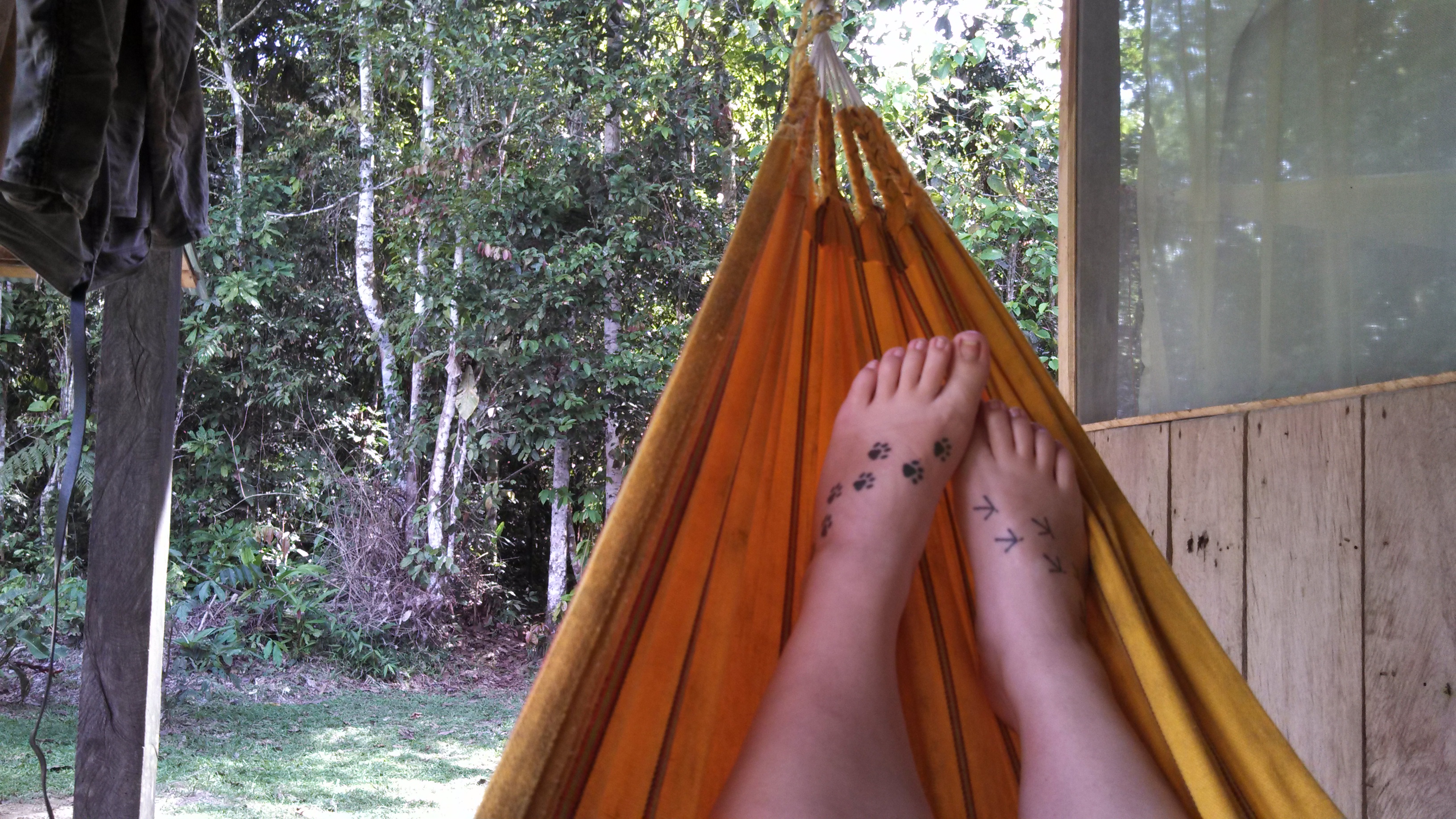“Those who contemplate the beauty of the earth find reserves of strength that will endure as long as life lasts. There is something infinitely healing in the repeated refrains of nature – the assurance that dawn comes after night, and spring after winter.” – Rachel Carson, Silent Spring
I’m going to tell you the most personal thing about myself.
If we were to meet through friends or work or the shared experience of trying to get a bartender’s attention in a crowded pub, here are some things you might “know” about me after a time: I’m loud, social, talkative, optimistic, and like to try new things. All of this is absolutely true. Even I get distracted and forget that there is more. But they are not me at my most basic. At my very core there are only a few things: I am in awe of the beauty of the natural world, I am crazy for Reed, my ginger-bearded, shy, craft brewer of a husband, and I need a lot of physical contact to stay sane.
My job often takes me away from two of these three pillars, and for months at a time. I travel the world’s oceans collecting and analyzing seawater on research expeditions. I am around people, but they are not MY people. Often, bumping into someone in cramped hallways du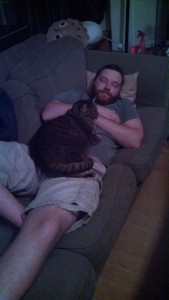 e to high swells is the only human contact I get. And sometimes I begin to forget who I am. Spending time contemplating the horizon during a particularly good sunrise or witnessing the albatross and other ship-following birds race the down drafts helps me remember, but I learned early on in my oceanographic career that it wasn’t enough. During long voyages there are days when I
e to high swells is the only human contact I get. And sometimes I begin to forget who I am. Spending time contemplating the horizon during a particularly good sunrise or witnessing the albatross and other ship-following birds race the down drafts helps me remember, but I learned early on in my oceanographic career that it wasn’t enough. During long voyages there are days when I
have had enough and begin to negotiate with the universe, begging it to transport me home for an hour or two and then, I swear, I’ll come back to work on this ship in the middle of the ocean. All I want at those moments is to be in my house, sitting on my couch, with my husband and our pets. This scene pulls on me from countless thousands of miles away.
My therapist encouraged me to conjure up a memory that didn’t take place at home, one so rich with meaning and detail that it could transport me, if only for brief seconds of the day, and there I could find comfort. For awhile the scene changed, often chosen from a trip just before a long voyage. But it kept reverting back to a generic scene of us wrapped up with each other on the couch, and I was left feeling just as alone and powerless as ever.
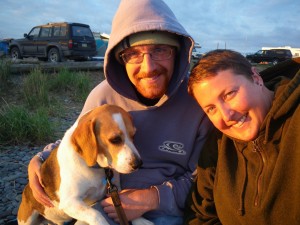
Since traveling the world is one of the perks of my job, Reed and I try to take a vacation before or after I go to sea, to try to get to know one more small part of this limitless planet. Spending time together doing something new is a cornerstone of our marriage, and a strong reason we’ve made it against the odds. One summer, we packed some camping gear and our beagle and drove to Alaska; we fell in love again while experiencing the natural glory of South Africa; and we explored the east coast of Australia in a campervan, from the reefs of the tropical north to happy hour at the opera house. So when I had to be in Ecuador for work, we made plans to see as much as possible with our limited vacation time. Having grown up interested in science and the natural world, we’d both learned a lot about the Galapagos Islands and were eager to visit. Multiple friends had recently been on jungle vacations and highly recommended the experience, so we decided to split our time between the islands of Darwin and the Amazonian rainforest.
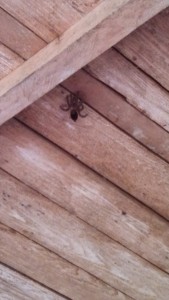
We arrived at Shiripuno Lodge at night after quite the journey – a bumpy flight over the Andes in a small plane, a harrowing drive in a seatbelt-less open air vehicle on tiny winding roads, and then 5 hours on the Rio Napo in a motorized canoe. Arriving in the dark can be an amazing experience, we’ve done it many times on camping trips, setting up just enough to fall asleep and seeing the rest of the world around us only in the morning light. But in the jungle, darkness means creepy crawlies – it is the time for flying cockroaches, scorpions, and spiders as big as your face. I wasn’t expecting, nor would I want, a sterile experience, but it was a surprise that the “lodge” we had booked was little more than plywood, with large gaps between the walls and ceiling, and no screens. There was no electricity, just a car battery connected to a power strip so we could charge our cameras. I came to terms with the fact that I would have a run in with some horrible bug during our stay. The words of my friends who recommended this sojourn came back to me.
“There will be tarantulas on the ceiling…” one had told me “…but they’re in the same place every day.” she added to reassure me. It did not. Enormous spiders are bad enough on the ground, the added terror that they could drop on me without warning was almost enough to keep me away. Visions of sloths, tapirs, monkeys, and other fantasies had over-ruled my arachnophobia, and I tried to remind myself of that while standing there in the darkness.
When we headed into our appointed room and I saw two separate beds, each with curtains of mosquito netting, I could not bear the thought of sleeping without Reed beside me, facing the night alone. He agreed to share a twin bed, something we’d never done before – a surprise perhaps since we got together in college. Somehow it made me feel better that he would be next to me when the inevitable happened. I even, only half-jokingly, suggested that he sleep in boots so stomping could commence immediately. I tried not to shine my flashlight around too much as we unpacked and readied for bed; I had already seen that one bed had an enormous spider web attached to it and I did not want to know more just yet.
We cocooned ourselves into the small space, tucking the netting under the mattress, and I begrudgingly set an alarm for a few minutes before 5am, when breakfast was served. But I never needed it, the world waking up around us brought me out of my surprisingly solid sleep with it. Birds, bugs, monkeys, species not yet even known to exist, all unseen, all singing about the coming dawn. Not many of my happy memories take place at 4am, none perhaps except this one. As the chirps, buzzes, hoots, and other songs broke their way into my slumber, I opened my eyes to that perfect blue that is night just before the dawn, when the pinks and oranges of the coming day start to melt away the black. Through my curtain of mosquito netting, out the gaps of the plywood “walls”, I could see into the trees. A green so all-consuming I could smell it emanated from the jungle just a few feet from my head. Stretching and rolling over, I saw Reed snoozing away next to me, not yet interrupted by this glorious symphony. His arm was under my neck and probably uncomfortably numb. His warmth, often an impediment to snuggling, was just right at that moment, even in the already humid tropical air. I felt small and protected tucked in at his side. I realized that this precise moment happened every day, whether we or anyone else was around to enjoy it. It was a comfort knowing that even, and perhaps especially, when we are not there, this glorious sunrise accompaniment happens nonetheless. We had made a pact with nature, who accepted our presence but did not need it. And when She has that much to say, I am happy to just be silent. I turned off the alarm before it could disturb the raucous peace and lay there, listening, until Reed woke up and it was time to get out of bed.
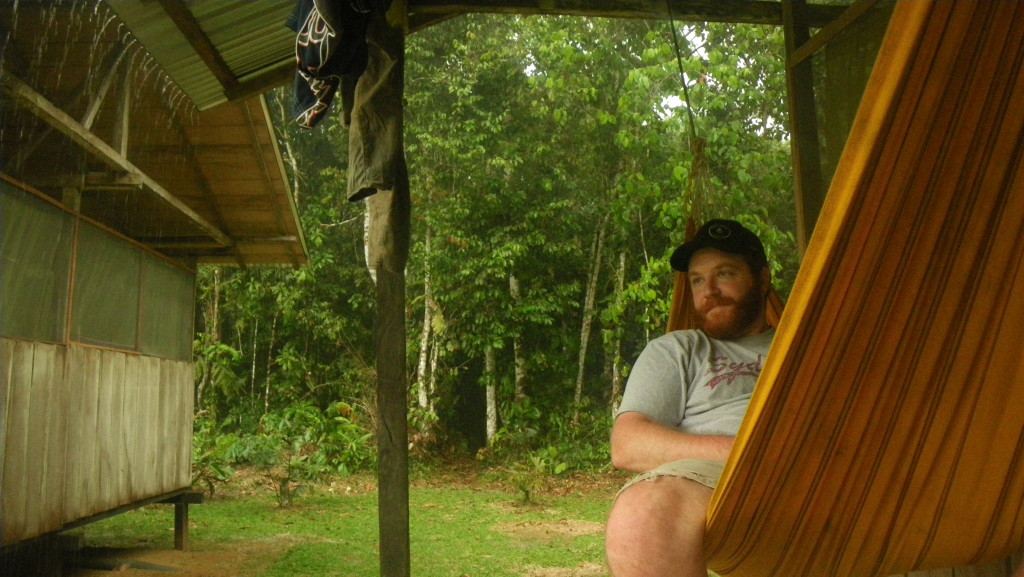
Each day we split into small groups and went hiking. Our guide, a short man named Marco from a nearby village, only kind of knew English and we only kind of know Spanish. Our other group members were a French couple who only kind of knew either language, and two American girls in their 20’s who considered the trip a splurge during their months-long vagabonding.
“A few months here costs the same as a few weeks in Europe,” Margaret reasoned.
“True enough.” was my reply, wishing I had thought of that ten years earlier when I blew all my savings in three weeks in western Europe.
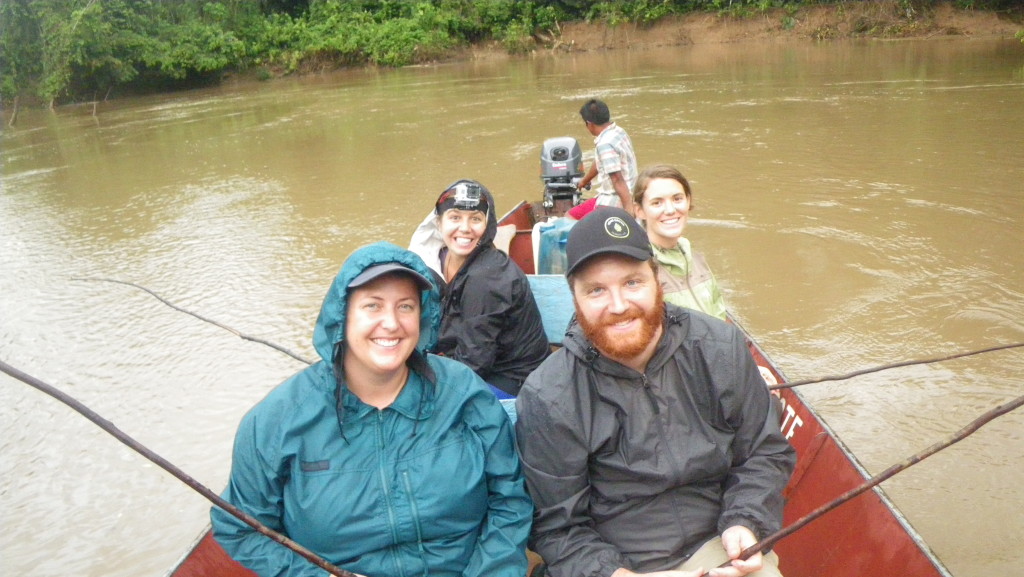
She and Neale were friends who lived in New England, and had similar silly-girl tendencies to my own. Reed was immediately outnumbered, being asked to stand guard when any of the three of us had to pee at inopportune times and places, and to hike in front since he was tallest, so we wouldn’t walk into any low-hanging spiderwebs. His hat was zig-zagged with them by the end of each day.
We saw wonders. I learned quickly that I could not both walk and look around at the same time. There was just too much life surrounding us; if I looked up while walking I could easily trip over tree roots or squash some small creature. I had to be content to explore the riches within my vision while watching the trail, and come to a complete stop when I wanted to take in the rest of my surroundings. Woolly monkeys on their commute, brachiating through the canopy as we rushed along below, trying in vain to keep up, our newly yellow fever-vaccinated blood pumping in our veins. Stepping gingerly over a miles-long trail of leaf cutter ants hard at work. Toucans clicking their ridiculously large bills at us as if they disapproved of our shenanigans. Marco expertly constructing a fort out of branches and leaves, hiding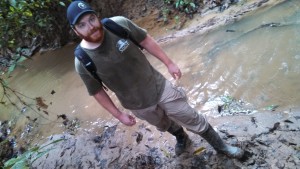 him completely from view. Caimans sunning themselves on their own private beaches as we motored by, our wake lapping on the muddy shores. Leaves big enough we could have used them as sleeping bags. Rainstorms appearing from nowhere, made much more enjoyable when we’d already made it back to base camp and could watch them from the hammocks on the porch. Marco breaking a branch off a seemingly uninhabited tree and stripping the bark away to reveal a line of ants he assured us were lemon flavored and quite harmless. Macaws, hummingbirds, eagles, and myriad other birds, all colorful beyond reason – and all making me feel closer to my beloved brother, an ornithologist who spent more time in South and Central American jungles during his extended undergraduate career than in those ivy-covered buildings in upstate New York.
him completely from view. Caimans sunning themselves on their own private beaches as we motored by, our wake lapping on the muddy shores. Leaves big enough we could have used them as sleeping bags. Rainstorms appearing from nowhere, made much more enjoyable when we’d already made it back to base camp and could watch them from the hammocks on the porch. Marco breaking a branch off a seemingly uninhabited tree and stripping the bark away to reveal a line of ants he assured us were lemon flavored and quite harmless. Macaws, hummingbirds, eagles, and myriad other birds, all colorful beyond reason – and all making me feel closer to my beloved brother, an ornithologist who spent more time in South and Central American jungles during his extended undergraduate career than in those ivy-covered buildings in upstate New York.
One day, while being pushed through a shallow stream connecting the river from a pond we were planning to fish in for piranha, Reed interrupted my peaceful thoughts. It was the calmness of his voice that alerted me that something was up.
“Melissa. There is something in the tree right above us.” I looked up, not sure what to expect.
“OH MY GOD, IT’S A SLOTH, IT’S A SLOTH, IT’S A SLOTH, EEEEEEEEEEEEEEE!”
“EEEEEEEEEEEEEEEEEE!” echoed Margaret and Neale.
“Shhhhhhh, come on, you’re going to scare it away.” Reed said to the three of us.
Sure enough, the sloth was hauling ass away from all the commotion. Slothful it was not at that particular moment, and I couldn’t blame it. We were breaking the pact we had made with the jungle, and so we did hush. I felt like I was going to faint from all the cute, but I managed to be quiet about it. It went back to eating, using its ridiculous curved claws to wind its way through the tree tops until it was eventually hidden from view.
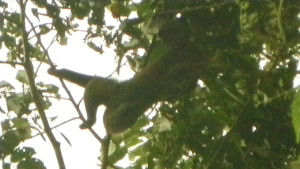
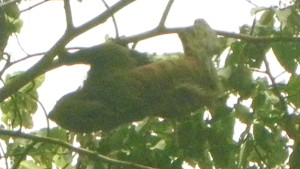
Believing as I did that a run in with a horrible bug was inevitable, I almost chickened out of the night hike. It was a few days into our stay, enough time that I fully understood just how much life we were surrounded by at all times, how outnumbered we were, how little nature cared about our presence or making us comfortable. The jungle has a balance that we don’t fit in to, being tall and preferring not to be crawled upon as we do. I mustered up the nerve though, realizing I would never forgive myself for missing out on such a unique experience. Reed agreed to switch the normal hiking order and walk behind me, as I was paranoid that something might crawl up my back and into my shirt collar. Again, we saw wonders. And because I was braced for the worst, I was relieved at the balance of life in the jungle at night. Cute little tree frogs croaking and winking in our flashlight beams. Spiders with horribly jointed legs as long as my fingers clinging to trees disconcertingly close to the trail. I’m not scared of snakes, so boas wrapped over tree branches made me smile, though others were not so sure. A spider with an enormous bulbous body that I only noticed when it crossed the beam from my head lamp, weaving its web at eye level across the trail. Cockroaches as big as a twinkie, that fly. And when we met back up with the other group that took a different trail, a video of two scorpions mating, twirling and articulating in ways I can never unsee. Thankfully the night hike was as intense as it got, I never had the direct confrontation with a creepy crawly that I so feared.
In the years since our visit, those five mornings where I woke up to nature’s clock morphed and became my happy place. I’ve never felt anything stronger than the draw of that time and place on my heart, on my body, on all of my senses. I can transport myself back there and inhabit the memory as if on a holodeck, manipulating angles and rewinding time as desired. I return often to find comfort and a feeling of home when I need it most. That spider’s web on the other bed is still there, but the only thing I see is the man next to me, his arm asleep from the awkward position, though he never moves it. All I hear is the whole world singing us awake. All I feel is safe, loved, and lucky. Every time I need it, I can conjure the same symphony of sounds, the same warmth beside me, the same blue in the sky. It reminds me of who I am, despite anything else. And now you know too. That I love nature, am mad about my husband, and need to be touched.
“It is possible to enter a jungle and become acutely aware of poison fang and rending claw…But it is infinitely more wonderful and altogether satisfying to slip quietly and receptively into the life of the jungle, to accept all things as worthy and reasonable; to sense the beauty, the joy, the majestic serenity of this age-old fraternity of nature, into whose sanctuary man’s entrance is unnoticed, his absence unregretted. The peace of the jungle is beyond all telling.”
– William Beebe, Jungle Peace
